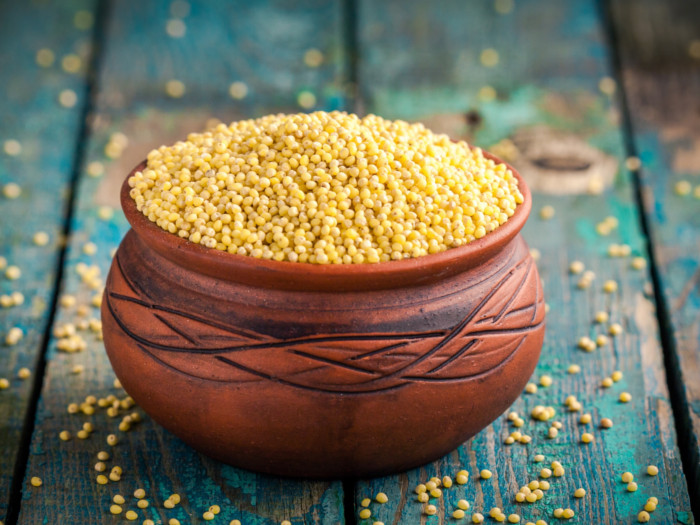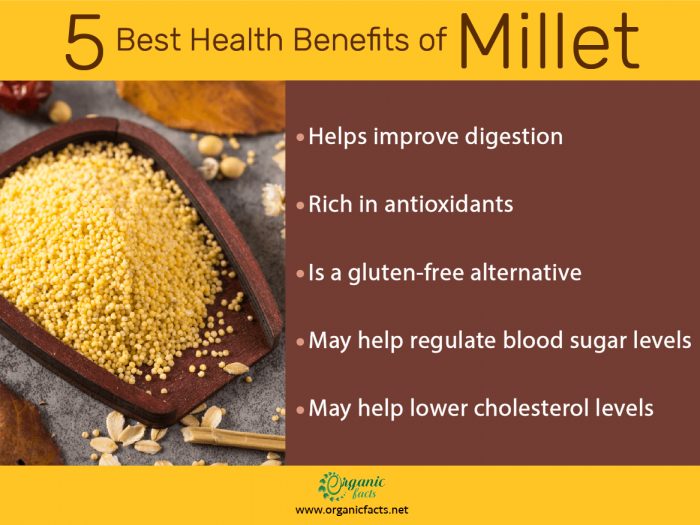The health benefits of millet can include its potential ability to protect the heart, improve the digestive system, detoxify the body, improve respiratory health, and manage diabetes.
What is Millet?
Millet is a group of small-seeded grasses, which is cultivated throughout the world, for human consumption. It is mainly grown in developing countries, but its ability to grow in relatively harsh, arid, and dry environments possibly makes it a highly versatile crop.
Although there are different varieties of millet grown around the world, probably the most common cultivar is Pennisetum glaucum, also known as pearl millet. In terms of history, it likely originated in Africa but then spread throughout Asia and the Middle East roughly 10,000 years ago. [1]
India cultivates approximately 8 million tons of these grains every year, followed by Africa and China. It can be used as a traditional cereal, and can also be used in porridge, snacks, and other types of bread. Millet is a good source of carbohydrates and fiber, like other grains. It can also be a good source of nutrients, vitamins, minerals, and organic compounds that can boost human health in various ways.
Millet is known to be gluten-free, so someone with gluten intolerance can turn to it as their source of grains, instead of wheat. Cross-contamination is still possible and millet should be purchased from factories that do not produce other grains that contain gluten. When in doubt, read the packaging. In terms of basic food staples, it can provide the most energy and B-vitamins.

A beautiful pot of millet Photo Credit: Shutterstock
| Serving Size : | |
|---|---|
| Nutrient | Value |
| Water [g] | 8.67 |
| Energy | 378 |
| Energy [kJ] | 1582 |
| Protein [g] | 11.02 |
| Total lipid (fat) [g] | 4.22 |
| Ash [g] | 3.25 |
| Carbohydrate, by difference [g] | 72.85 |
| Fiber, total dietary [g] | 8.5 |
| Calcium, Ca [mg] | 8 |
| Iron, Fe [mg] | 3.01 |
| Magnesium, Mg [mg] | 114 |
| Phosphorus, P [mg] | 285 |
| Potassium, K [mg] | 195 |
| Sodium, Na [mg] | 5 |
| Zinc, Zn [mg] | 1.68 |
| Copper, Cu [mg] | 0.75 |
| Manganese, Mn [mg] | 1.63 |
| Selenium, Se [µg] | 2.7 |
| Thiamin [mg] | 0.42 |
| Riboflavin [mg] | 0.29 |
| Niacin [mg] | 4.72 |
| Pantothenic acid [mg] | 0.85 |
| Vitamin B-6 [mg] | 0.38 |
| Folate, total [µg] | 85 |
| Folate, food [µg] | 85 |
| Folate, DFE [µg] | 85 |
| Vitamin E (alpha-tocopherol) [mg] | 0.05 |
| Vitamin K (phylloquinone) [µg] | 0.9 |
| Fatty acids, total saturated [g] | 0.72 |
| 12:0 [g] | 0 |
| 16:0 [g] | 0.53 |
| 18:0 [g] | 0.15 |
| Fatty acids, total monounsaturated [g] | 0.77 |
| 16:1 [g] | 0.01 |
| 18:1 [g] | 0.74 |
| 20:1 [g] | 0.02 |
| Fatty acids, total polyunsaturated [g] | 2.13 |
| 18:2 [g] | 2.02 |
| 18:3 [g] | 0.12 |
| Tryptophan [g] | 0.12 |
| Threonine [g] | 0.35 |
| Isoleucine [g] | 0.47 |
| Leucine [g] | 1.4 |
| Lysine [g] | 0.21 |
| Methionine [g] | 0.22 |
| Cystine [g] | 0.21 |
| Phenylalanine [g] | 0.58 |
| Tyrosine [g] | 0.34 |
| Valine [g] | 0.58 |
| Arginine [g] | 0.38 |
| Histidine [g] | 0.24 |
| Alanine [g] | 0.99 |
| Aspartic acid [g] | 0.73 |
| Glutamic acid [g] | 2.4 |
| Glycine [g] | 0.29 |
| Proline [g] | 0.88 |
| Serine [g] | 0.64 |
| Sources include : USDA [2] | |
Millet Nutrition Facts
Millet is important because it possibly has a uniquely high content of nutrients. According to the USDA FoodData Central, it contains high starch levels, B vitamins, calcium, iron, potassium, zinc, magnesium, and fats. Furthermore, there are plausibly high levels of dietary fiber, which can contribute even more to the health benefits of this important grain! [3]
Health Benefits of Millet
Let’s take a look at the amazing benefits of millet.
Can Protect Heart Health
Researchers from the University of Kentucky have shown a link between whole grains and the better heart health. Millet can be one of the healthier grains to add to your diet if you want to protect your heart. It is possibly a rich source of magnesium, which is an important mineral for reducing blood pressure and may help maintain a healthy heart. [4] [5]
Cholesterol levels go hand-in-hand with heart health, so the possibly high fiber amount in millet can make an ideal food for those who are trying to lower their cholesterol (aim for below 200mg/dL). Dietary fiber also helps to eliminate bad cholesterol (LDL cholesterol) from the system while maybe even promoting the effects of good cholesterol (HDL cholesterol), too. [6]
Can Aid In Diabetes Management
Millet, at its source, is considered to be a gluten-free whole grain. It can be a good source of fiber and may have a low glycemic index which can have a positive effect in the fight against diabetes. Apart from these obvious benefits, a study published in the Frontiers in Plant Science journal also cites millets as a suitable dietary component to combat the growing prevalence of diabetes worldwide. [7]
May Aid in Digestion
Millet can help move your gastrointestinal system, says Journal of Range Management. It may also help in eliminating problems like constipation, excess gas, bloating, and cramping. By regulating your digestive processes, you can also improve your nutrient retention and may as well reduce your chance of more serious gastrointestinal conditions which may include gastric ulcers. Regular digestion and elimination of waste may also help optimize your kidney, liver, and immune system health, as those organ systems are closely related to the body’s metabolic activities. It is important to not eat too much millet in one sitting or else there might be adverse side effects. [8]

Millet is gluten-free, so someone with gluten intolerance can turn to it as their source of grains, instead of wheat.
Potentially Rich in Antioxidants
Millets are possibly a rich source of phenols and antioxidants. Many of these antioxidants that may be present in millets can clean up toxins from your body. Quercetin, curcumin, ellagic acid, and various other beneficial catechins may help rid your system of any foreign agents and toxins, possibly by promoting proper excretion and neutralizing enzymatic activity in certain organs.
May Help Prevent Asthma Symptoms
According to research published by the Indian Institute of Millets Research, it can be helpful for people suffering from asthma. The paper suggests that the high levels of magnesium that can be found in pearl millets may help alleviate respiratory issues in asthma patients while also reducing migraines. [9]
Word of Caution: Given the modern stresses on our body, particularly to our glandular system, the excessive work needed to digest and process millet may be damaging. Consider speaking to your doctor about your glandular and thyroid health before making a major shift to a diet that includes millet.
